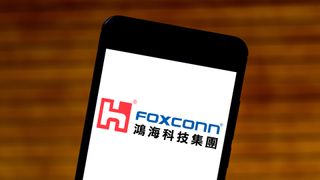Taiwan considers fining Foxconn over China investment
The semiconductor giant became an investor in a Chinese chip conglomerate earlier this week, which has raised the alarm in the Taiwanese government

The government of Taiwan is thinking of fining semiconductor giant Foxconn up to NT$25 million (approximately £706,000) over its investment in a Chinese chip company without first receiving regulatory approval.
Earlier this week, Foxconn became a shareholder in Tsinghua Unigroup, a Chinese chip conglomerate, after spending ¥5.38 billion yuan via a subsidiary, according to Reuters.
Foxconn reportedly didn’t seek approval from the government before investing in the Chinese company, and could have violated a law governing the nation’s relationship with China. Taiwan has been increasingly worried about its neighbour’s ambition to grow its semiconductor industry and has tabled new laws to prevent what it claims to be is China stealing its chip technology.
Regulators are now considering whether to punish Foxconn with the maximum fine possible, which is NT$25 million, because of the big size of the investment into the Chinese company.
IT Pro has contacted Foxconn for comment. The company referred Reuters to an earlier filing on the stock exchange, claiming it will deliver the necessary documents to Taiwan’s Economy Ministry's Investment Commission in the near future.
The company could be given a fine between NT$50,000 and NT$20 million for investing without the government’s approval, with regulators set to scrutinise the decision and make a decision once Foxconn has submitted an investment application, another source told Reuters.

Your key to digital differentiation and competence
Database services fit for app modernisation, cloud-native innovation, and data-driven strategies
"There's a chance that an approval will be given. If not, Hon Hai will have to withdraw the investment," the source said, using Foxconn's formal name, Hon Hai Precision Industry Co Ltd.
Get the ITPro. daily newsletter
Receive our latest news, industry updates, featured resources and more. Sign up today to receive our FREE report on AI cyber crime & security - newly updated for 2024.
Laws in Taiwan state that the government is able to prohibit investment in China, based on considerations of national security and industry development. Those who break this law could be fined repeatedly until a change is made. The government stops companies from building advanced chip fabs in China to make sure their best technology remains in the country.
Foxconn has been attempting to acquire semiconductor plants around the world as the global chip shortage continues.
However, Taiwan may also be wary of US bans on China-made technology. Earlier in July, the US also contemplated placing new restrictions on shipments of chipmaking tools to China. The move is targeting SMIC, the country’s largest chipmaker and supplier of Huawei devices. The US Commerce Department is leaning towards a potential ban on export of tools to Chinese semiconductor fabs producing advanced chips with 14nm nodes or similar.
Zach Marzouk is a former ITPro, CloudPro, and ChannelPro staff writer, covering topics like security, privacy, worker rights, and startups, primarily in the Asia Pacific and the US regions. Zach joined ITPro in 2017 where he was introduced to the world of B2B technology as a junior staff writer, before he returned to Argentina in 2018, working in communications and as a copywriter. In 2021, he made his way back to ITPro as a staff writer during the pandemic, before joining the world of freelance in 2022.





